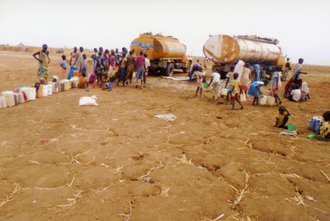Concerns raised at US plans to lift sanctions on Sudan

South Sudan refugees queuing for aid in Sudan - image ACN
Friends of the besieged Christian community in Sudan believe the US will use this week’s United Nations General Assembly in New York to bury news that it is lifting sanctions on the regime. They warn the move signals that the US will not hold other repressive leaders around the globe to their promises to reform.
The sanctions, imposed by President Clinton, were intended to punish Sudan for its support for terrorist jihadists like Osama bin Laden. Sanctions were strengthened by George W Bush when the Khartoum regime launched a campaign of ethnically cleansing Darfur of black Africans in 2003.
In January, just before President Obama left office, he suspended the sanctions for six months. His administration announced benchmarks for the Sudanese regime to meet, in order to have sanctions permanently lifted. President Trump postponed a decision in July, but is rumoured to be ready to establish friendlier relations with the resource-rich African nation.
The most significant US benchmark called for, “….a marked reduction in offensive military activity, culminating in a pledge to maintain a cessation of hostilities in conflict areas in Sudan and steps toward the improvement of humanitarian access throughout Sudan.” (1)
Maddy Crowther of UK-based NGO, Waging Peace, warns that the US has interpreted the benchmark as applying only to Sudanese Armed Forces’ conflict with rebel groups. However, four million unarmed civilians, out of Darfur’s six million population, remain displaced due to attacks by the Khartoum regime and their tribal proxy militia (2).
According to Crowther, “Washington made its judgment after the Sudanese regime had already announced its victory over the rebels in Darfur. This ignored the long-standing systematic attacks on civilians which included barrel bombing, mass rape, torture, and the alleged use of chemical weapons in the Jebel Marra region.”
Crowther also notes that while the Khartoum regime has finally allowed international charities to have limited access to areas of Sudan that have been sealed for years, it has not guaranteed those charities will be able to deliver much-needed aid unhindered.
The Trump Administration’s controversial move has been condemned by Lord Alton, who visited Darfur at the height of the Khartoum’s ethnic cleansing campaign in 2004. Alton, a member of the All Party Parliamentary Group on Religious Freedom and Belief, points to authoritative reports of churches being demolished or seized, and clergy being harassed and detained.
“Six years ago, Khartoum’s systematic campaign of ethnic cleansing spread from Darfur to the Nuba Mountains and Blue Nile State,” said Alton. “Christians, animists and moderate Muslims there endure aerial bombardment by the Sudanese armed forces. Fields are bombed to prevent farmers planting or harvesting, and malnourishment is rife. This is not the moment to take the pressure off the Sudanese regime. America should be using its diplomatic and economic leverage to make Khartoum abide by the multiple promises it has made to the international community, and then broken.” (3)
In August, US Secretary of State Rex Tillerson singled out Sudan’s treatment of religious minorities for comment. He said, “The government arrests, detains and intimidates clergy and church members. It denies permits for the construction of new churches and is closing or demolishing existing ones.” (4) Tillerson’s concern does not appear to have influenced his boss.
Campaigners warn that President Trump’s decision will be popular with both the UK government and the European Union. The latest in a series of UK-Sudanese summits will take place in London in November. Meanwhile, several European countries are keen to establish trading relationships with Sudan, and are pushing for debt relief. The EU is also engaged in the so-called Khartoum Process, whereby Europe will work with the Sudanese government to prevent would-be immigrants crossing its territory on the way to the Mediterranean coast (5).
The Sudanese leader, Field Marshall Omar Bashir, was indicted for the crime of genocide by the International Criminal Court in 2009 (6). He came to power in a coup in 1989, and has remained in office following a series of elections that have been condemned as flawed by outside observers.
Rebecca Tinsley’s novel about Sudan, “When the Stars Fall to Earth,” is available on Amazon.
• https://obamawhitehouse.archives.gov/the-press-office/2017/01/13/executive-order-recognizing-positive-actions-government-sudan-and
• Maddy Crowther, www.WagingPeace.info September 18th 2017
• Lord Alton, September 17th 2017
• www.state.gov/j/drl/rls/irf/religiousfreedom/index.htm?year=2016&dlid=268700#wrapper
• www.theguardian.com/commentisfree/belief/2016/oct/13/immigration-fears-make-the-eu-prepared-to-do-business-with-murd
• www.bbc.co.uk/news/10603559
See also: ICN 6 September 2017 - Sudan: Christian refugee children must recite Islamic prayers before receiving food www.indcatholicnews.com/news/33334
and: ICN 14 September 2017 Sudan’s Nuba Mountains – People Under Siege - www.indcatholicnews.com/news/33396


















